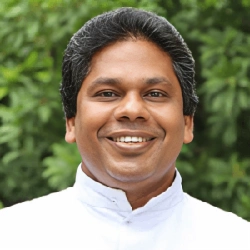
Augustine Pamplany
Xavier-Loyola Institute of Interdisciplinary Research, Trivandrum, IndiaPresentation Title:
From experience to empathy: Self-reflective learning in psychiatric nursing
Abstract
Experiential knowledge has become central to modern nursing pedagogy, emphasizing the integration of lived experience, reflection, and critical thinking within clinical education. This shift aligns with contemporary interdisciplinary approaches in health sciences, where collaboration, self-awareness, and evidence-based practice are considered essential for preparing competent and compassionate professionals.
Clinical training remains a cornerstone of nursing education, where students merge theoretical concepts with professional practice. In psychiatric care, nurses encounter complex and dynamic challenges that demand not only technical expertise but also strong reasoning and problem-solving skills. These abilities are best nurtured through evidence-based learning supported by self-reflection, enabling students to analyze experiences, enhance understanding, and improve future performance. This study explored the impact of a pre-clinical workshop combined with self-reflective learning diaries on nursing students’ knowledge and attitudes toward psychiatry. Two hundred third-year BSc students participated, equally divided into experimental and control groups. Assessments were conducted before psychiatric placement and after 30 days of clinical exposure, using structured questionnaires and attitude scales. Prior to placement, results showed no significant baseline differences between groups. After placement, the experimental group scored notably higher in knowledge (mean 30.92) and displayed more positive attitudes (mean 134.53) than the control group. A moderate positive correlation was observed between knowledge and attitude, influenced by factors such as age, prior exposure, religion, and completion of psychiatry theory classes.
The findings confirm that reflective learning fosters deeper understanding, reduces stigma, builds confidence, and improves perceptions of psychiatry among nursing students. Embedding reflective practices into curricula is consistent with interdisciplinary trends in education, ensuring that nursing students are equipped with both technical knowledge and empathetic insight to provide effective, holistic mental health care.
Biography
Augustine Pamplany is director of the Institute of Advanced Interdisciplinary Studies (iaiss.com) at Jnana Niketan Institute of Philosophy and Religion, Aluva, and research dean at the Xavier-Loyola Institute of Interdisciplinary Studies, Loyola College of Social Sciences, Trivandrum. He holds doctorates in ethics of geoengineering (Dublin City University, Ireland) and philosophy of science (International University, Colombo). He earned an MSc from Madras University; an MA in bioethics from the Universities of Leuven (Belgium), Radboud (Netherlands), and Padova (Italy); and an MA in philosophy from Jnana Deepa, Pune. His specialized research on the neurocognitive dimensions of belief was carried out at Oxford University and Coventry University, UK. A fellow of the International Society for Religion and Science, Cambridge, he lectures widely in India and abroad on Philosophy of Science, Science and religion, and bioethics. He also serves as managing editor of Omega – Indian Journal of Science and Religion. He is a member of the UNESCO Forum of Teachers in biomedical ethics.

